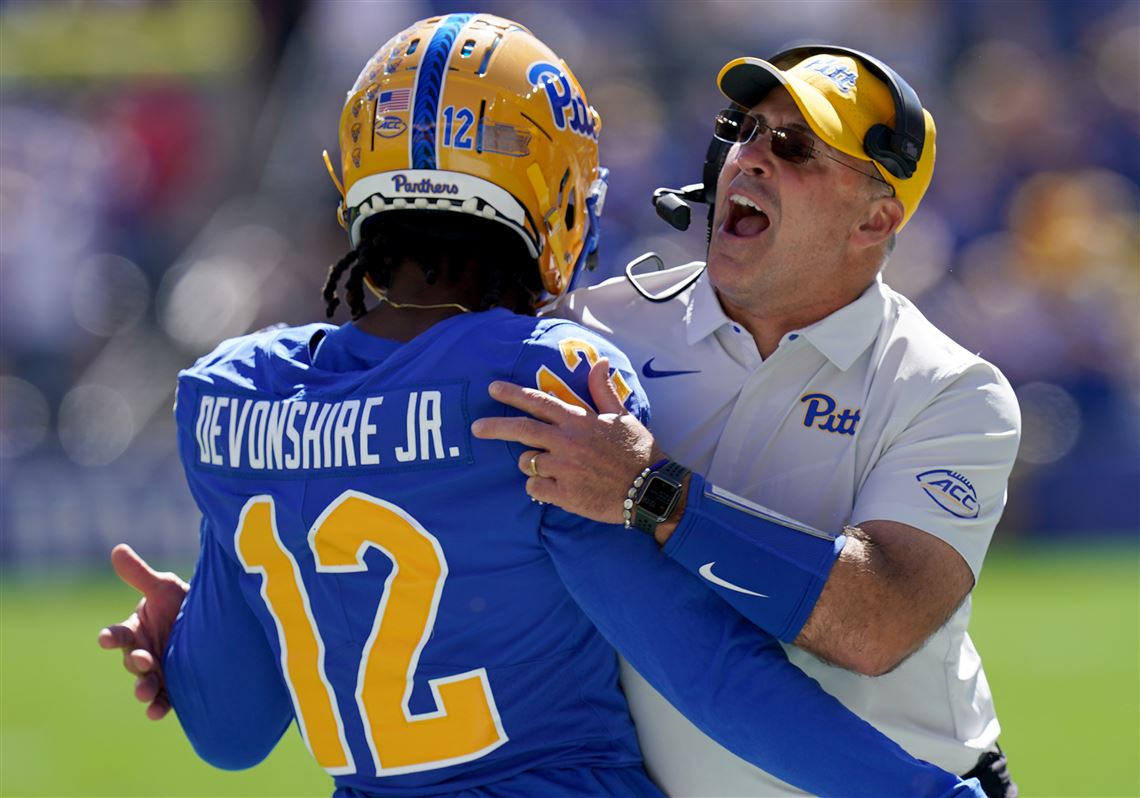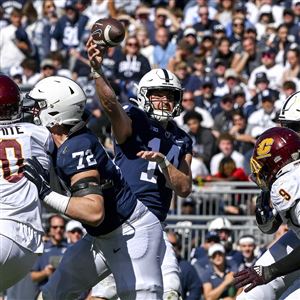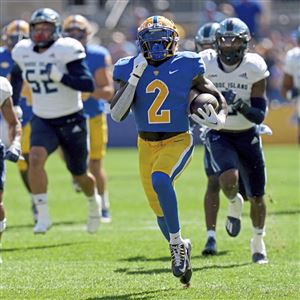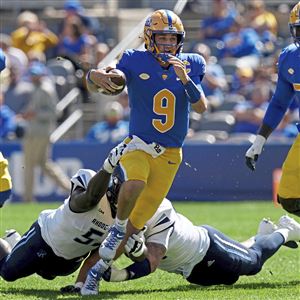Although at times it wasn’t pretty, No. 24 Pitt improved to 3-1 Saturday afternoon after defeating Rhode Island at Acrisure Stadium by a final score of 45-24. With the game now in the rearview mirror and its first ACC matchup up next, here are five takeaways from the Panthers’ win to keep in mind as we move forward.
1. More M.J. Devonshire, please
Those who saw him play in high school are well aware of what M.J. Devonshire can do as a return man. In his senior year at Aliquippa in 2018, Devonshire was just one shy of tying the national record for punt return touchdowns in a season (9).
Pitt fans were exposed to Devonshire’s abilities Saturday, when the redshirt junior returned the first punt of the game 82 yards for a score. The long touchdown came on Devonshire’s first career return with Pitt. Pat Narduzzi took time following the win to explain why it took four weeks for the speedy cornerback to get a significant opportunity on special teams.
“He’s only had two prior to today, and he didn’t catch either one of them, so you’re a little afraid of putting him back there,” Narduzzi said, “but we made a decision to put him back there, take some off the receivers because we’re short-handed there, and he did a nice job. He’s fast, and we saw that in the WVU game. If you get the ball in his hands — again, I think it gave him a lot of confidence today, gave the coaches a lot of confidence when he goes back there, something good can happen. Great blocking, as well.”
Wide receivers Konata Mumpfield and Jaylon Barden are the two other players on Pitt’s roster that have returned punts so far this season — both average less than a yard per return. While Devonshire’s two other punt returns against the Rams weren’t great, his big play in the opening quarter Saturday should at the very least earn him more chances to make an impact on fourth downs moving forward.
2. Run-first offense?
Through four games this season, 61% of Pitt’s 277 offensive plays have been runs. While the return of Frank Cignetti Jr. at offensive coordinator implied the Panthers would run the football more than they did in 2021, few expected things to be this lopsided.
In each of its three wins this season, Pitt has run the ball more than it has thrown. With that formula out in the open, it would be fair to call the Panthers a run-first offense, right?
Those within the Pitt locker room still say otherwise.
“It all depends on what they’re giving us,” Narduzzi said Saturday. “You want to throw if they’re playing deep and giving you what they’re giving us. We’ll adjust every week based on what we’re seeing and what they’re going to give us. I’m sure Georgia Tech will be in the box trying to stop the run, and we’ll move on to them here tomorrow.”
Part of the reason Pitt has taken a ground-and-pound approach as of late is connected to the health status of its starting quarterback. With Kedon Slovis out in Week 3 against Western Michigan, the Panthers threw the football just 12 times.
Even with him back on the field Saturday, Pitt’s offense featured conservative play calling. However, the senior signal caller still feels his group can move the ball through the air when desired.
“We’re very multiple,” Slovis said of his team’s offense. “I feel like we can do a lot of different things depending on the strengths of the defense we play in our matchup.”
If matchups are indeed the primary factor in determining how often the Panthers depend on their ground game, it could be fair to expect another heavy dose of running next week. Pitt’s next opponent, Georgia Tech, has struggled mightily against the run, allowing an average of 209.5 yards per game and 4.23 yards per carry through its first four contests.
3. Ease up on Izzy
After getting just 11 total touches in the team’s season opener against West Virginia, no Pitt player has had a heavier workload in the past three weeks than Israel Abanikanda.
Since the WVU game, the junior running back has averaged over 28 touches a contest, with most coming on the ground. So far, Pitt’s decision to ride Abanikanda’s hot hand has worked — the Panthers’ feature back has eclipsed the 100 yards rushing three straight weeks.
However, the heavy workload looks to already be taking its toll.
Abanikanda was seen multiple times getting up slowly after taking hits Saturday against Rhode Island, with the most notable coming late in the second quarter after returning a kickoff.
“There’s going to be bruises and stuff, but that’s what the game comes with,” Abanikanda said Saturday. “You’ve got to be a soldier.”
Abanikanda has indeed shown his ability to be a good “soldier.” But perhaps moving forward, his commanding officers should pick and choose where they can limit his exposure to contact.
While it’s clear Pitt’s offense is at its best with Abanikanda in the backfield and taking a bulk of the carries, it’s fair to wonder if continuing to use the junior in other areas of the game, like returning kickoffs, is worth the risk.
Narudzzi said Saturday he “wasn’t scared” when Abanikanda looked to be banged up in the first half. Yet, as injuries continue to pile up, the idea of losing a player as pivotal as Abanikanda is something the Panthers should find quite frightening.
4. Injuries starting to show
Matched up against an FCS opponent, it was clear Narduzzi wasn’t pressed to play any of the handful of key contributors who are currently recovering from injuries. And though once again Pitt was able to grind out a win thanks to its depth, the absence of some of its top performers is starting to show on both sides of the ball.
The biggest gripe most had in the Panthers’ win over the Rams was the defense’s performance. A closer look at those who actually took the field for Pitt on Saturday explains why there were some struggles.
Four of the five top defensive ends on the Panthers’ depth chart did not play against Rhode Island. Starters Habakkuk Baldonado and Deslin Alexander were both dressed for the contest but remained on the sidelines, while their backups, Dayon Hayes and Nate Temple, stood next to them in sweatpants.
Narduzzi admitted after the game that his team’s pass rush isn’t creating enough pressure and cited injuries up front as a reason why.
Meanwhile, on offense, the absence of notable names has without question played a factor in how Pitt has attacked opponents when it possesses the football. Through four weeks, the Panthers’ biggest inconsistency has been in the passing game.
Injuries to Slovis, Jared Wayne, and now Gavin Bartholomew — who stood on the sideline with his left arm in a sling against Rhode Island — have prevented the group as a whole from finding any sort of chemistry.
Receivers Konata Mumpfield and Bub Means have looked better in recent weeks but have yet to show they can be dependable primary options. More time and experience could help solve that problem. If not, Pitt will need some speedy recoveries for its offense to become truly balanced.
5. The real season starts now
In his opening postgame remarks, Narduzzi pointed out that his team looked a bit flat.
“I didn’t think we had the emotion I think you need to come with every Saturday afternoon, for whatever reason,” the eighth year head coach said.
With non-conference play now finished, the Panthers should no longer have that issue. Regardless of where it stands in the AP poll, Pitt’s remaining schedule of games are the ones that matter.
Based upon the showings in the first four weeks from other teams in the ACC Coastal division, there is no reason to believe the Panthers aren’t capable of reaching the conference title game once again. Pitt should be the betting favorite in every contest it plays in for the foreseeable future.
Expectations entering the 2022 campaign were high. And with ACC competition starting Saturday at 8 p.m. against Georgia Tech, now is the time for Pitt to show the country why that’s the case.
Noah Hiles: nhiles@post-gazette.com and Twitter @_NoahHiles
First Published: September 25, 2022, 4:35 p.m.
Updated: September 25, 2022, 5:41 p.m.




















